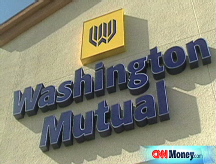WaMu CEO: 3 weeks work, $18M
Alan Fishman could be eligible for a multi-million paycheck after only three weeks on the job ... if he decides to keep it.
NEW YORK (CNNMoney.com) -- Washington Mutual Chief Executive Alan Fishman could walk away with more than $18 million in salary, bonuses and severance after less than three weeks on the job, according to the terms of his employment agreement.
But will Fishman follow the lead of another troubled financial firm and turn his severance package down?
JPMorgan Chase (JPM, Fortune 500) grabbed up the banking assets of WaMu on Thursday after federal regulators seized the company, making it the largest bank failure in history.
JPMorgan Chase CEO Jamie Dimon said in a conference call with reporters Friday that no decisions have been made about the fates of WaMu senior executives.
Still, the demise of WaMu is likely to be the end of Fishman's brief tenure at the helm.
Fishman was hired on Sept. 7, replacing former long-time CEO Kerry Killinger, who was ousted as a result of the company's many financial woes.
WaMu did not reply to requests for comment about Fishman's severance package. But some details were outlined in his employment agreement, filed with the Securities and Exchange Commission on Sept. 11.
Fishman had a base annual salary of $1 million, which translates to $19,230 per week. So during his three weeks on the job, he would receive a base pay of about $60,000 before taxes.
His target annual bonus was 365% of his salary, or $3.65 million. In the agreement, it was unclear how much of the annual bonus he would be eligible for, if any.
The agreement said that Fishman could be eligible in 2009 for a long-term incentive award, which would be worth at least $8 million. But the agreement also said this is based on the assumption that would serve as CEO for the "full year" of 2009.
Also, if Fishman has to pay taxes because of any severance he receives as a result of the takeover, then the company would cover those taxes. That would potentially give Fishman millions of dollars more.
Fishman also got a multi-million dollar sign-on bonus. But he may have to pay it back, depending on certain conditions outlined in the agreement.
Fishman's sign-on cash bonus was $7.5 million as well as 612,500 shares of WaMu, which are now virtually worthless. Shares of WaMu plunged more than 90% to 16 cents a share on Friday.
The agreement says that Fishman would have to pay back part or all of his bonus if he ends his employment for any reason other than "constructive termination," or if the company terminates his employment with "cause."
If Fishman is terminated without "cause" - which could mean the loss of a job due to a takeover of the firm - or if he resigns because of "constructive termination," than he would receive a lump severance payment of $6.15 million. This figure is 2.5 times his base salary of $1 million plus the maximum bonus of $3.65 million.
The agreement did not specify constructive termination, but it is generally characterized as an employee voluntarily quitting because of intolerable working conditions.
When you add up his salary, the possible bonuses and the lump sum payment, Fishman could walk away with more than $18 million.
But the CEO of another prominent financial firm in a similar situation recently decided to turn down his severance package after the firm essentially collapsed.
Robert Willumstad, former chief executive officer of insurance giant AIG (AIG, Fortune 500), which the government took an approximately 80% stake in after giving it an emergency $85 billion loan, was dismissed last week after only about three months on the job.
Willumstad has reportedly told his successor that he has decided not to accept his $22 million severance package since AIG shareholders and employees had lost so much money as a result of its meltdown.
Matt McCormick, portfolio manager with Bahl & Gaynor Investment Counsel, said he thinks that Fishman will not be rewarded extravagantly given that the bank failed.
"I will give WaMu the benefit of the doubt that they hired this person to make WaMu work, not to get foreclosed," he said.
But McCormick added that the WaMu failure wasn't necessarily Fishman's fault, because "their goose was cooked long ago."
In the future, employment agreements for CEOs might include more details on restricting multi-million dollar bailouts after brief tenures, McCormick said. ![]()



